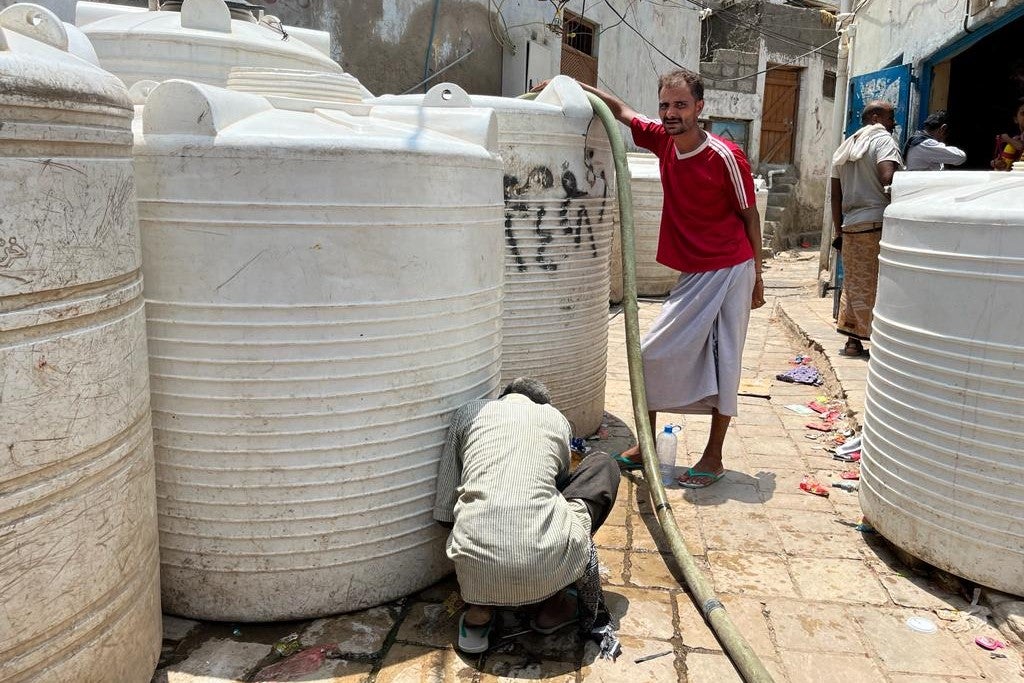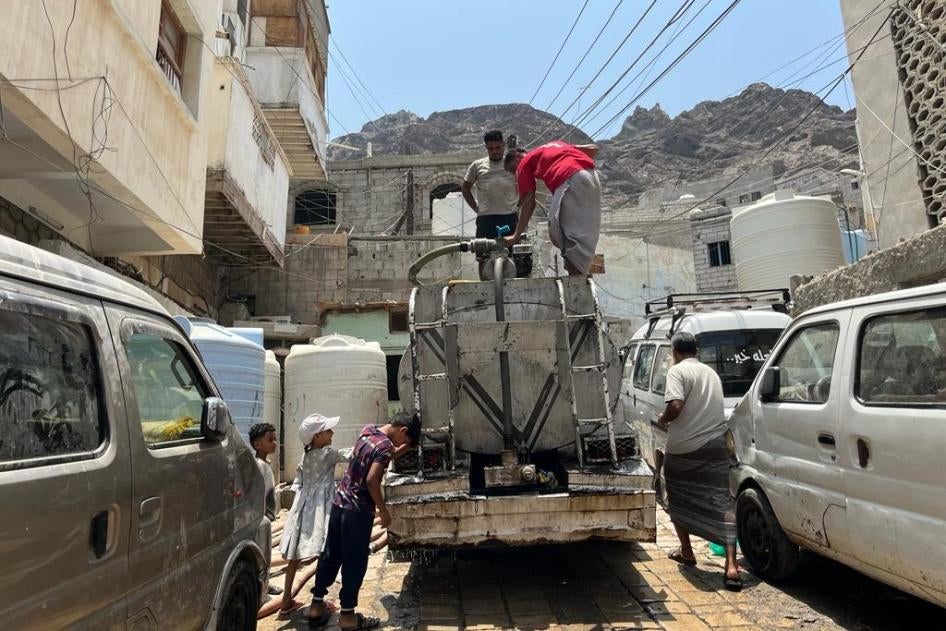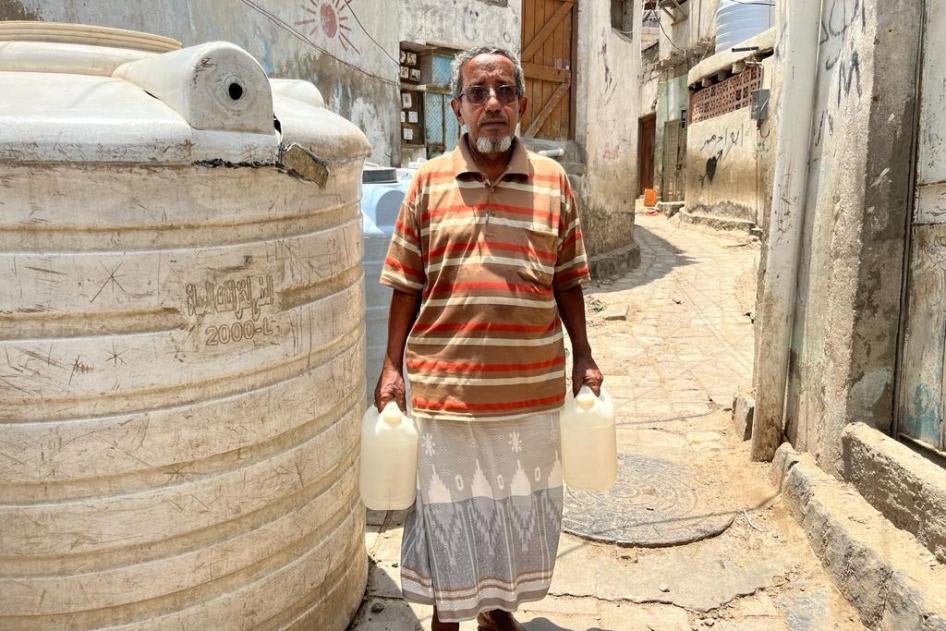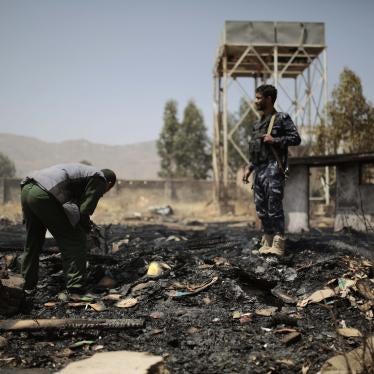(Beirut) – The Yemeni government and the Southern Transitional Council (STC) are failing to fulfill Aden residents’ right to electricity and water, Human Rights Watch said today.
Since the start of the conflict in Yemen, the residents of Aden, the largest city in southern Yemen and the provisional capital of the Yemeni government since 2015, have experienced frequent and increasingly common restrictions on, and shutoffs of, water and electricity. These shutoffs negatively affect residents’ rights to health, education, and other rights essential for adequate standard of living, including adequate housing, safe and sufficient water, and adequate sanitation.
“Yemen’s government and the Southern Transitional Council have an obligation to provide access to adequate water and electricity in Aden,” said Niku Jafarnia, Yemen and Bahrain researcher at Human Rights Watch. “And yet, when residents have protested the cuts, security forces have responded by firing on them.”
In the nine years since the conflict began, the availability and accessibility of safe water and sufficient electricity has worsened in the city. “Since 2015, we have been suffering and it’s only getting worse,” one Aden resident told Human Rights Watch.
Human Rights Watch spoke with 26 people, some of them internally displaced, living in a small village near the city center, and with the government, nongovernmental organizations, and international organizations, about access to water and electricity and government support. Human Rights Watch also interviewed people in various neighborhoods and collected evidence of water and electricity shortages in various areas of the city.
Several people interviewed said that before the war began in 2014, Aden residents had a comprehensive, regular, and affordable supply of electricity and water. Now, many residents only get water from the public network once every two or three days, or not at all.
In July and August 2023, the government-run electricity producer was only able to provide power for about four to six hours a day for many city residents. Still, this was an improvement from June, when publicly supplied electricity was only available for about two or three hours a day, leaving many households without adequate air conditioning in sweltering heat. Summer temperatures in Aden average between 27 and 36 degrees Celsius (81 and 96 degrees Fahrenheit) and regularly soar above 38 degrees Celsius (100 degrees Fahrenheit), in addition to 65 percent average humidity. The situation regularly produces a heat index dangerous to human health especially for children, the elderly, and those with chronic diseases.
Extreme heat exposure is a serious health hazard. It can cause heat rash, cramps, heat exhaustion, or heat stroke, which can be fatal or have lifelong consequences.
While the country remains in conflict, Aden has been relatively stable and the violence in the governorates near the conflict’s front lines largely has not affected the city. The Houthis, who control much of the country, entered the city in the spring of 2015, but were pushed out after a few months of fighting against Yemeni government and Saudi and UAE-led coalition forces. Later, in 2019, the UAE-backed Southern Transitional Council – which was loosely allied with the Yemeni government in Aden – took over the governorate.
Since that time, there have been brief outbreaks of violence between various coalition forces and other armed groups in the city, but no airstrikes or larger ground attacks since 2015, and the STC has maintained control over the governorate.
The STC and the Yemeni government are part of a government coalition in Aden, where STC members comprise part of the eight-member presidential leadership council that replaced former President Abdo Rabbu Mansour Hadi in 2022. Both the STC and the Yemeni government, as governing authorities in Aden, are obligated to protect and fulfill Aden residents’ right to water and electricity. In August, the Yemeni government’s House of Representatives published a report finding that “the Electricity Ministry has suffered from widespread corruption.”
One resident, who lives within the city center and has relatively greater access to public services than many other residents in the city, told Human Rights Watch: “During the war, they cut the water, but the situation today is something different: it’s unbelievable. Water doesn’t come every day. We get it every two days. There are five people in our small family. The water that comes is barely enough to last those two days.”
Internally displaced people have even less water access. A camp manager for one of the largest camps for internally displaced people in the city said that the camp relies on nongovernmental groups for water, and that camp managers continuously reach out to various humanitarian organizations and NGOs to bring water to the camp to meet residents’ water needs.
Access to electricity in Aden has also been a significant problem since the war started. Before the war, residents always had electricity except sometimes for an hour or two a day in the summer. But residents said the situation has become much worse, especially in the last two years. Some people said electricity is only available for about four to six hours a day: either one hour every six hours or two hours every eight hours.
The lack of regular access to electricity has a negative impact on education. A teacher living in Aden said that during sweltering conditions, the lack of electricity to run fans or air conditioning made it “hard for students to process information. The psychological impact [on students] is very real. Electricity is a basic need for education, as is lunch.”
Several people working in health services in the al-Tuwahi district of Aden said that the only way that they have been able to continue operating is by using funding from nongovernmental groups to buy fuel for private diesel generators, as well as the donation of solar panels from these groups. A doctor recalled rushing to save a premature baby in an incubator when the neonatal unit where she works lost electricity.
Several protests erupted in Aden during the summer, with residents demanding greater availability of electricity. Sana’a Center, a Yemeni research organization, said that “the [STC] police have used force to crack down on protesters and discourage further demonstrations.” Human Rights Watch verified video footage that showed the security forces shooting at protestors.
Human Rights Watch wrote to the Human Rights Ministries of both the Southern Transitional Council and the Yemeni government. The Council replied to the letter on November 2, stating that “the STC doesn’t have jurisdiction or responsibility over Aden’s electricity or water.” However, research indicates that it has de facto control over Aden, including over electricity and water. The government of Yemen did not respond.
The Yemeni government and the STC should coordinate with each other on their obligations and immediately carry out their responsibilities to respect, protect, and fulfill the human rights of Aden’s residents, Human Rights Watch said.
“The Yemeni government and the STC are failing people across Aden,” Jafarnia said. “Their mismanagement has led to families not having drinking water, students struggling to learn in schools without electricity, and public health clinics having to chase nongovernmental groups for funding.”
Harm From Shutoff of Water Access
Yemen has long been one of the most water-scarce countries in the world, a problem that has been exacerbated by historical government mismanagement and by the actions and violations of warring parties during the conflict. Climate change-related natural hazards, such as droughts and floods, have also worsened the water crisis in Yemen.
While the country remains in conflict, Aden has been relatively stable and has, in large part, not been affected by the violence that has impacted the governorates near the conflict’s front lines since the STC took over in 2019.
An individual working at the Aden Local Water and Sanitation Corporation told Human Rights Watch that the war in 2015 had little effect on Aden, saying that the “main issue from 2011 to 2020 is the lack of support and maintenance.”
Residents of Aden still have better access to water and electricity than people in most other parts of the country. “The best coverage [of water] right now is in Aden,” the individual working at the Corporation said. And yet, the “best coverage” is failing to meet residents’ needs, demonstrating a broader failure by the government to fulfill its obligations to provide everyone living in Yemen, without discrimination, with sufficient, reliable, safe, clean, accessible, and affordable access to water and electricity.
Shab Aidroos is a neighborhood outside of Aden’s city center at a higher elevation. This means that a system of pumps is required to move water there from a facility in the city center, near sea level. When these pumps are not supplied with electricity, water cannot reach elevated areas like Shab Aidroos.
Several people living there said that before the war the neighborhood had adequate access to water and electricity. But since 2015, the public water supply no longer comes to their homes. “The water networks decreased, the electricity decreased, and the population increased,” said Osamah (a pseudonym), a long-time resident of the neighborhood, who like others did not want to be identified by their names for their protection.
Hasna, an older woman living in Shab Aidroos, said that water only came to the neighborhood about every four days. “Of course it’s not enough,” she said. “Everything is limited, everything is restricted. The laundry is restricted, the showering is restricted. Before we could just use the water, but now we count everything, we are always counting the water.”
The neighborhood largely relies on private donors and a community-led initiative to pay for water delivered via private tanker trucks twice a week. “We had to get the water trucks because the water is not coming from the government, and then we had to have everyone bring their tanks down to the ground because we could not get the water to the roof,” Osamah said.
Paying for water trucks is not affordable. Each delivery costs about 15,000 Yemeni rial (approximately US$10) for only 2,000 liters when most salaries in the area are about 40,000-50,000 Yemeni rial (approximately US$27-$33) per month. According to guidance from the World Health Organization (WHO), 2,000 liters of water would serve the needs of about eight people for a month.
In another district of Aden, al-Tuwahi, residents have also had to raise funds and independently gather financial resources to purchase water since government-provided water is only available once every three days. “We have an agreement with different families and people in the community to get water for the school,” said a teacher working in the area. “This is all because of personal relationships that we find these solutions.”
Mohammed, a 55-year-old man living in Shab Aidroos, said, “It is very difficult for us … before the war the water came to my house through the network … but now I have to go down [to the street] with water canisters. It is very tiring.… We’re old people, and we have to wake up in the middle of the night to bring water from down in water canisters.”
The water shortages disproportionately affect women and children, who are often responsible for getting water for their families. They often spend hours walking on dangerous streets, where they are at greater risk of sexual and gender-based violence, sniper attacks, and land mines. Children – mostly girls – miss school to go and line up for water for their families.
The quality of the water provided has also deteriorated since 2014. A youth activist from Crater, a neighborhood in the center of Aden, said that, “We don’t drink from the water, it’s not healthy.”
The absence of safe and sufficient drinking water and adequate sanitation has contributed to an increase in water-borne illnesses and disease in Yemen, according to the United Nations Children’s Fund (UNICEF), including a cholera outbreak from 2016 to 2021 that caused over 2.5 million reported cases.
Aden residents said that though the availability and accessibility of safe water has worsened each year since 2015, they have received no explanation or assistance from the government. “We spoke with the local council and the water corporation. but they didn't give any solutions,” one person said. “We even met the water minister himself, but there are no solutions.”
“The government doesn't help at all,” Hasna said.
Dar Saad Camp
As of February 2023, Aden was host to about 145,857 internally displaced people, according to the Executive Unit for IDP Camps Management, mostly in formal displacement camps. The camps are spread out throughout the city, and none are connected to the public water supply. Human Rights Watch visited one of the larger camps in Dar Saad neighborhood, where residents rely on aid and nongovernmental groups, which provide irregular water services.
“Sometimes [the water] is gone for longer than one week,” said Salem, a 40-year-old man living in the camp. “Sometimes we fight over the water.”
Samah, 24, another camp resident, gets the water for her family of six. Whenever a group delivers water to the camps, which doesn’t follow a schedule, she immediately lines up. “Sometimes it takes 30 minutes, sometimes it takes two hours,” she said. “I bring five water canisters, which [is a total of] 20 liters for six people. I can’t carry them all myself, but anyone can help.”
According to camp residents and an employee in the Executive Unit, the quality of water that humanitarian actors supply has also decreased since the start of the war, forcing camp residents to spend their limited incomes on drinking water from nearby shops. “Before, we drank from the [NGO-supplied water], and now we have to pay for drinking water, a canister of 20 liters is 300 Yemeni rial [approximately $US 0.2],” Hasna said.
The water at the Dar Saad camp is also not potable and can only be used for non-drinking purposes, the residents said. “We buy 20 liters of Kawthar [drinking water] for 200-300 Yemeni rial [approximately US$0.13-0.2] at the store,” Samah said. “For someone who doesn’t make money, this amount is a lot.” Her husband works daily jobs; sometimes receiving about 5,000-6,000 Yemeni rial [approximately US$3-4] a day, and sometimes not finding any work.
Human Rights Watch spoke with a doctor working in two camps for displaced people, including Dar Saad, about cases of illness she has seen that might be stemming from contaminated water or the lack of water. “There are many cases of acute gastroenteritis [stomach flu], sometimes 55 cases per day, and of the 55 it is usually more than 35 kids,” she said. Dar Saad camp has a population of about 1,300 children.
Electricity Cuts
The availability of and access to electricity has also significantly declined since the start of the war. One Aden resident said that before the protests over electricity shortages during the summer, the availability of electricity had been even worse. “Before we were sitting without electricity for more than nine hours … now it is maybe two hours on, eight hours off.”
Human Rights Watch visited al-Tuwahi district of Aden, just outside of the city center with a low- to middle-income population, and spoke with seven residents, including four working in education and health care, to better understand the impact of the lack of electricity on schools and health facilities. Human Rights Watch also visited an emergency obstetrics clinic in the district and spoke to one of the doctors working there.
“There’s no schedule,” a teacher said. “It comes or it doesn’t come. You can’t predict it. No areas get more or less electricity in Aden – everyone is suffering in the same way.”
“People are suffering, and it is getting worse,” said another resident.
Al-Tuwahi has five health clinics, each of which has access to electricity as regularly as the rest of the city: about six hours a day. But six hours a day of electricity is not enough to operate these clinics, particularly an emergency obstetrics clinic, and a clinic that is open for 24 hours a day.
The government’s support for public healthcare facilities has been insufficient to mitigate the impact of the electricity shortages. “The government gives us 40 liters a month of fuel,” said a person working in public health. “A generator is 140 kilowatts and would use 40 liters [of fuel] in two hours.”
To manage the lack of electricity in the clinic, the Public Health Department has had to raise funds for solar panels and fuel for generators from “private businessmen” and nongovernmental groups. “The solar isn’t even enough,” said a person who works in the Public Health Department. “The power cuts happen sometimes and then we have to stop working.”
A doctor working in the emergency obstetrics clinic said that their clinic sometimes performs emergency C-sections and other procedures that can be made much more dangerous and even life threatening without access to electricity. She said that a week earlier, an electricity shutoff had caused the incubators in the neonatal intensive care unit to stop working. The team in the clinic had to rush one of the babies to a hospital in another district. “It was so painful because we couldn’t do anything,” she said.
Staff members said that without contributions from nongovernmental groups and private donors, the two emergency health clinics would not be able to function, and the three other clinics would have to limit their hours to the times when government-provided electricity is available, which is unpredictable. “It’s all based on personal connections,” a person working in al-Tuwahi's public health department said. “The government needs to be helping us.”
The lack of electricity also disrupts education. A person working in al-Tuwahi for the Education Ministry said that in general, the 13 public schools in the district might receive two hours of electricity during the school day, in addition to limited electricity that a few schools obtain from solar panels provided by the UN, nongovernmental groups, and private donors: “We’ve got no help for things like keeping the electricity on. Since 2016 there has been nothing from the government on this front.”
A teacher said the lack of electricity made the classroom environment very challenging. “Of course the lack of electricity has an impact on students,” the teacher said. “Especially in their ability to learn. They can’t focus on their studies, they are just focused on being hot or trying to be less hot.”
Teachers also struggle to do their jobs in the heat. “The teachers can’t teach well if it is too hot and the students can’t concentrate when all they can think about and all they can do is try and fan themselves,” said the person in the Education Ministry. “The only thing anyone is thinking about is the heat.”
Residents have been left to fend for themselves and their communities, pooling funds or finding external donors and nongovernmental groups to help pay for fuel for private electricity generators and solar panels.
There’s no electricity because there’s no diesel and there’s no state: they haven’t been helping with this stuff at all,” said one Aden resident. “Everyone is just doing it for themselves.”
One person living in al-Tuwahi district said that when a fuse in the network for their neighborhood exploded, they had to “raise money as a community to buy a new fuse,” but that soon after “it broke again.”
According to the World Economic Forum, of the 20 most water-stressed countries in the world, Yemen has the highest solar energy potential. The Borgen Project, a nonprofit dedicated to fighting extreme poverty, has stated that the expansion of solar energy production in Yemen could address “Yemen’s urgent need for more reliable and affordable energy” while also “contribut[ing] positively to the environment.”
Government and Southern Transitional Council Response
Throughout the summer of 2023, the decreasing availability of electricity and water, and the broader lack of adequate public services amid an economic crisis, provoked widespread protests in Aden.
Human Rights Watch also verified and geolocated two videos published on social media by Yemeni journalists and activists of a protest in Khour Maksar district on August 22. The videos show STC forces attacking protesters and injuring some of them. According to Sheba Intelligence, an open-source intelligence platform, eight people were injured from live ammunition fired on protesters by the security forces.
“Either you obey them or they put you in detention or they kill you, but they don’t want to listen to the concerns of the people,” said one activist in Aden who has been calling on the STC and government to provide more services, including electricity and water, to his neighborhood.
Revenue from oil exports is the largest source of income for the Yemeni government. The government has blamed Houthi attacks on government-controlled oil ports for their inability to export fuel, which is a critical source of revenue and also provides fuel for the electricity supply. The UN Special Envoy for Yemen, Hans Grundberg, also criticized the Houthi attacks, saying in November of 2022, that the Houthis “carried out attacks against oil terminals and ports in Hadramawt and Shabwa governorates with the aim of depriving the Government of Yemen of its main source of revenue from exporting oil.”
However, an Electricity Ministry employee said that the real reasons behind the lack of income from fuel exports were far more complex than the Houthi attacks, and involved government corruption.
In August, the Yemeni government’s House of Representatives published a report “documenting alleged violations by several public institutions,” including the Electricity Ministry, said the Sana’a Center. The House of Representatives found that “the Electricity Ministry has suffered from widespread corruption and has become a black hole in the government budget, requiring massive funds without supplying a minimum level of electricity in return.”
Legal Obligations
The right to water entitles everyone, without discrimination, “to have access to sufficient, safe, acceptable, physically accessible and affordable water for personal and domestic use.”
The right to water, which includes the right to safe and clean drinking water and sanitation, is derived from the right to life and the right to an adequate standard of living, and has been repeatedly affirmed by the UN General Assembly and UN Human Rights Council.
Likewise, the Yemeni government and the STC have a duty to ensure that everyone in their territory or jurisdiction has access to electricity. The internationally protected right to an adequate standard of living includes everyone’s right, without discrimination, to sufficient, reliable, safe, clean, accessible, and affordable electricity, Human Rights Watch said.
Access to electricity is critical to ensuring other rights, including but not limited to health, housing, water, and education, and should be recognized as a distinct human right. This means ensuring adequate and sustainable electricity generation and supply, and international cooperation to ensure reliable, affordable, and available electricity for the end user.
In a recent review of Yemen’s compliance with the International Covenant on Economic, Social and Cultural Rights (ICESCR), to which Yemen is a signatory, the Committee on Economic, Social and Cultural Rights (CESCR) expressed concern regarding the conflict’s severe and long-term ramifications on economic, social, and cultural rights by the Yemeni population. The Committee said that the conflict in Yemen does not negate Yemen’s responsibility to fulfill its obligations under the Covenant.
The STC, as an armed non-state entity that exercises “de facto control over [a] territory and population,” is obligated to “respect and protect the human rights of individuals and groups” living under their territory, including the rights to water and electricity. The STC controls Aden, as well as other areas in southern Yemen, and exercises significant governance-like functions. Its control over Aden obligates it to protect the right to water for those living within the governorate. This obligation does not negate the Yemeni government’s continued obligation to fulfill economic, social, and cultural rights.













